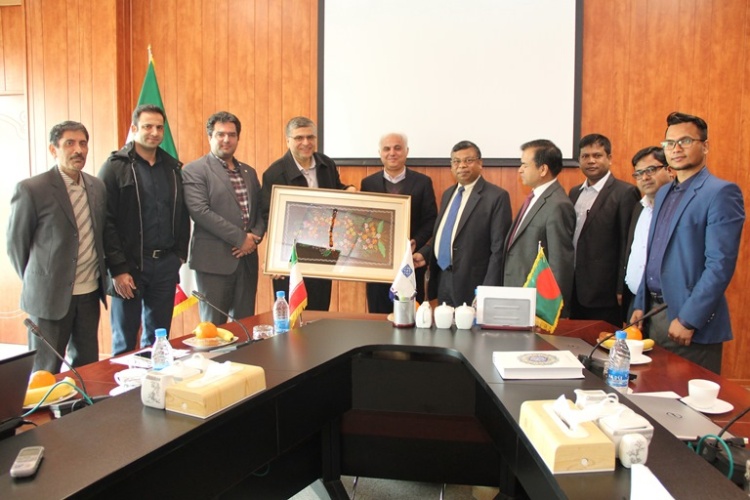Meeting Between the TUMS Authorities and the Bangladesh Ambassador to Iran

The meeting was held at the TUMS headquarter on Feb 15, 2020, with the attendance of Dr. Kordi, the TUMS Vice Chancellor for Global Strategies and International Affairs; AFM Gousal Azam Sarker, the Bangladesh Ambassador to Iran; Mr. Humayun, Bangladeshi Embassy Advisor; Dr. Nekoofar, the TUMS Director of International Relations; Dr. Zargaran, the Vice Dean for International Affairs of the School of Persian Medicine; some TUMS staff; and Bangladeshi students studying at TUMS.
After a brief introduction by both parties, Dr. Kordi gave a short presentation about TUMS as the highest ranking university in medical fields in Iran and an outstanding university in the region. He also provided some facts about TUMS and its schools, hospitals and research centers, achievements and the crucial role that TUMS plays in providing health services to over three million people in the huge city of Tehran.
Dr. Kordi described TUMS as a great collaborative partner for other domestic and international educational and research institutes. “TUMS is ready and open to establish collaboration in different areas like joint programs, developing new programs, joint research and sharing experience with educational and research institutes in Bangladesh”, added Dr. Koradi.
Then, Dr. Nekoofar complimented Bangladeshi students on how hardworking and committed they are. Pointing out to the connection between TUMS and other top universities in Iran, Dr. Nekoofar stated that with the establishment of a consortium of cooperation among the top five Iranian universities (Tehran University of Medical Sciences, Iran University of Medical Sciences, the University of Tehran, Amir Kabir University and Sharif University) and the communication network with the country's medical universities, there is no need to approach these universities separately, and in fact, TUMS can create the interaction platform for the embassy of Bangladesh.
Dr. Nekoofar added: “There are a lot of areas for collaboration such as in stem cell therapy and Traditional Persian Medicine. The parties should reach MoU agreements; however, the first step would be recognition of the educational system and institutes in Iran by the authoritative bodies in Bangladesh, and vice versa”. He also stated that holding summer schools in Iran would be a great approach to bring Bangladeshi students and make them familiar with the Iran educational system or establish joint programs. These summer schools may include different programs such as nursing, public health, nutrition, and other programs in different levels.
Dr. Zargaran emphasized on the potentials existing for collaboration between TUMS School of Persian Medicine and Bangladeshi educational institutes. He stated that the educational system of Iran, India and Bangladesh, especially in the field of traditional medicine, are similar, and therefore, suggested trilateral cooperation among these countries.
Referring to the cultural similarities between Iran and Bangladesh, AFM Gousal Azam Sarker, the Ambassador of Bangladesh stated that Bangladesh has been trying to develop relations with Iran including cooperation in the field of education, research and technology. He also stated that Iranian students may attend different programs in Bangladeshi institutes such as Bangladesh Medical University, Engineering University and Dhaka University. Mr. Sarker also suggested that there is a good opportunity for collaboration with the TUMS’ School of Persian Medicine in the field of Alternative Medicine. He continued that he would take the details of the discussed subjects to the Bangladeshi authorities, would follow up on this matter, and would be in touch with the TUMS about the outcome.
At the end of the meeting, Dr. Kordi answered the questions raised by the Bangladesh Ambassador, and expressed his willingness and determination to work with the Bangladeshi Ambassador and other authorities to take necessary actions for the recognition of the TUMS degrees by the Bangladesh Medical and Dental Council (BMDC). Dr. Kordi also stated that TUMS would welcome the delegates and Chancellors of the Bangladeshi universities to Iran in order to visit the TUMS campus and to meet with the TUMS authorities.
Following the meeting, AFM Gousal Azam Sarker paid a visit to the Iranian National Museum of Medical Sciences History as well as the TUMS School of Persian Medicine.

Your Comment :